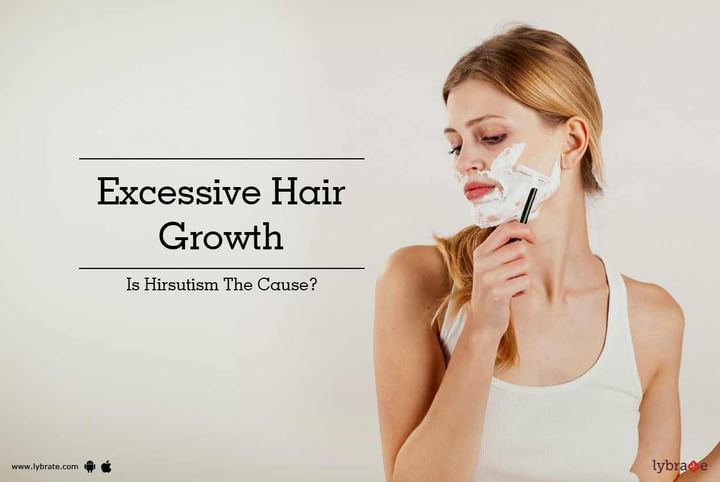Excessive Hair Growth - Is Hirsutism The Cause?
There are women who feel their looks are spoilt because of the presence of excessive body hair. While hair on women's body is common, excessive body hair isn't a normal condition and must be taken seriously. Women are generally unaware that the condition is known as Hirsutism.
What is Hirsutism?
Hirsutism can be defined as growth of excessive facial and body hair in women. With the world obsessed with flawless skin, such changes from feminine hair pattern (soft, fine, vellus hair) to masculine hair pattern (hard, dark, terminal hair) in a woman is generally unwelcoming and, hence, very distressing for the woman.
Why do some women develop Hirsutism?
In order to understand the reasons for such excessive growth in some women, it is important to understand the differences in the physiology of men and women. The male or female appearance of one's body is dependent on a delicate balance between male and female sex hormones. There is a predominance of the hormone estrogen in a woman's body, whereas androgens (testosterone) are the predominant sex hormones among men. However, some amount of androgens is secreted by the ovaries and adrenal glands (located next to kidneys) in women also. But, an excessive production of these hormones results in Hirsutism. Hormonal imbalance is by far the most common cause of Hirsutism.
Causes of Hirsutism:
1. Endocrine causes
- Polycystic Ovarian Syndrome (PCOS) - PCOS is a condition of hormonal imbalance in the body, which can result in an irregular menstrual cycle, enlarged ovaries with a cystic appearance on USG, infertility, obesity and hirsutism. For more information on the causes and management of PCOS.
- Cushing's syndrome - Excessive production of hormone Cortisol by the adrenal glands can lead to symptoms such as high blood pressure, abdominal obesity, skin discoloration, muscle weakness, irregular menstruation, and hirsutism etc. This syndrome is known as Cushing's syndrome.
- Congenital Adrenal Hyperplasia (CAH) - CAH is a condition of excessive production of hormones Androgens and Cortisol by the adrenal glands and generally manifests in childhood in the form of virilization. In such cases, CAH can present with symptoms such as ambiguous genitals, obesity, hypertension etc. However, sometimes the manifestation of CAH is deferred to early adulthood and results in milder symptoms, hirsutism being one of them.
2. Tumors - Tumors in ovary or adrenal glands can again cause hirsutism due to excessive production of androgens
3. Medications
- Long term steroid consumption (commonly used for immunosuppression, rheumatoid arthritis, and multiple sclerosis)
- Performance enhancing drugs (often used by athletes)
4. Idiopathic - The woman may be having hirsutism despite normal hormone levels
Treatments:
There are essentially two lines of treatment for hirsutism - one is medical management and the other is a cosmetic treatment.
Medical treatments for Hirsutism -
A. Birth control pills - It's possible to reduce the severity and intensity of hair growth using birth control pills- the most commonly prescribed medical intervention! The birth control pills help by decreasing the production of androgens by ovaries. Besides this, estrogen present in the pills also helps the liver to produce more of sex hormone binding protein- these proteins bind to circulating androgens, thereby reducing their action on the body. Both these actions help in reducing the growth of hair on the body.
B. Anti-androgen medications - There are three categories of anti-androgen medications, which are commonly used for the treatment of hirsutism.
- I. Spironolactone - Spironolactone is a diuretic medicine, which blocks the effects of androgens on the hair follicles, thus controlling hair growth.
- II. Finasteride - Finasteride works by blocking the conversion of body testosterone into its more potent chemical entity, thereby limiting the effect of testosterone on hair growth.
- III. Flutamide - Flutamide is a potent anti-androgen, which blocks the actions of androgens and helps in controlling the hair growth.
However, we have to ensure that the woman is not pregnant when taking any of these three medications. These medicines are often combined with oral contraceptives, which also have a synergistic effect in reducing the severity of hirsutism. One should also seek an expert opinion before starting these medications as there can be serious side effects, especially on liver.
C. Steroids - Low dose dexamethasone can be used to control the overactive adrenal glands when used carefully. However, long-term steroid therapy has got its own side effects and this therapy should only be considered under expert care and guidance.
D. Insulin sensitizing medicines - Medicines such as Metformin and Pioglitazone (Basically these are anti-diabetic medications) help in reducing insulin resistance in the body, which, in turn, helps in controlling the effects of excessive circulating androgens.
Cosmetic treatment for Hirsutism -
One very important aspect of cosmetic management of hirsutism is self-care. This can include shaving, waxing, use of depilators and bleaching creams. All these measures help to reduce the amount of visible hair in undesired parts of the body. But, this needs to be done very frequently for a sustained visible effect.
Permanent hair removal is also possible using electrolysis or LASER treatment. In electrolysis treatment, electric current is passed into the hair follicle using a needle, which damages the root of the hair permanently. Similarly, LASER treatment uses LASER to destroy the hair follicle. Both these are effective methods to get rid of the undesired hair. However, we do not yet know if there are any long-term complications or side effects of these methods and these methods are not yet approved by the US FDA. If you wish to discuss about any specific problem, you can consult a Gynaecologist.



+1.svg)
